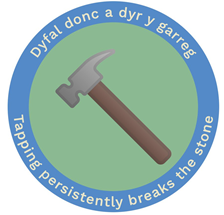Weeknotes 24/02/2023
Preparing for a new dawn
March is always a busy month, as it proceeds that magical day of 1 April. No, not April fool’s day, but the first day of a new financial year for many organisations - including ours.
As this new dawn draws closer, that sense of urgency grows. Everyone is really busy and Heledd is trying to prioritise and find more ways to share our plans and priorities with others.
We can’t do everything - and we make sure everyone’s well-being is taken care of. Taking lunch breaks, our weekly wellbeing hour and having a day off now and then is the most important thing.
Budget management stuff
Heledd has been busy with money matters, such as:
- End of year finance work. Making sure everything is budgeted, invoiced and paid for - by some critical deadlines is a number 1 priority.
- Planning finances for next year (1 April onwards) - which also means trying to get confirmation of what work we can plan and commit to next year.
For the record, spending days in spreadsheets and financial systems is not Heledd’s favourite place to be.
Making space for a new Corporate Plan
Every few years, like most organisations, we refresh and revise our organisational priorities - an important piece of work that influences and sets the direction for the years ahead.
We’re using this as an opportunity to have our Marie Kondo moment for the ‘About us’ section of the website. This content does not spark joy, and worse than that, is the type of content that clogs up the search for users trying to complete a task.
Sophie is working with Louise (a Content Designer from DXW) on finalising what we’re going to keep / remove, then we’ll start hitting the ‘unpublish’ button very soon.
For the intranet, Kim thinks she’s deleted over 1,000 pages already. I wonder if we’ll have made a (tiny) dent in our carbon footprint during this process.
Updated charges
As covered by Shaun and others in recent weeknotes, we’re expecting a lot of changes to charges to come in by 1 April.
The team is amazing at looking into the details and asking the questions that users are likely to have, which could then cause more queries for our colleagues who receive applications.
There’s a lot to do before and after April. But this week we started having more regular catch ups (stand-up style) so that we can openly share progress and quickly find solutions - trying to work in a more agile way with the SROC Team.
Great feedback from training with Christine
This week Christine (from Crocstar) wrapped up the second round of training for Introduction to writing user-centred content.
We’ve been working with Christine (plus a gang from DXW, Basis and Fourthwall content) for just over a year as part of a wider piece of work around content strategy.
Our goal was to increase awareness of good content so that everyone benefits - whether someone is writing a technical report themselves, or working with a content designer in the Digital Team.
The timing of the training, with the new Content and publishing manual going live, feels like we’ve made great headways over the last few months in helping colleagues understand what the website is for.
I also feel that there’s growing appreciation for what our team does - which feels really good!

If you go down to the woods today…
Phil’s been more like Miss Marple this week. Doing detective work to understand what our forestry pages and attachments contain. He started with the acid sensitive catchment page.
It’s taken some time and lots of detective work to understand this process. He has been trying to understand what task a user needs to do on each page (not as easy as you’d imagine).
I will give you an example:
The current page reads:
The UK Forestry Standard (UKFS) sets the standard for sustainable forest management. It has seven associated guidelines and the Forests and Water Guidelines (F&WG) (Forestry Commission, 2011) (UK publication in English only) require that an assessment of forestry’s contribution to acidification and the recovery process be made, in catchments of water bodies that are vulnerable to acidification. This requirement was included in the 4th edition of the F&WG (2003) but no details were provided on how to implement certain aspects of the assessments.
What we should be saying to help our users complete the task is:
Trees can affect water acidification. It is important to make sure the acidification of rivers and streams does not get worse by cutting down trees.
Contact us to find out if your felling proposal is in an ‘at risk’ or ‘failing’ acidification area.
If your felling proposal fails the acidification check, we will not be able to give you a felling licence.
The detective work on one page is done, just another 20 more to go.
Card sorting
The amazing James carried out a card sorting exercise this week.
James used software called ‘Tree Jack’. He sent our users of the website the new forestry information architecture.
Tree Jack helps us test how easy our users find content on our website. It helps us to understand how our users see the hierarchy of content on our site. It then lets us test, iterate and confirm our information architecture.
Tree Jack came up with some very interesting findings and James turned these findings into a report. We then reflected, and reworked the page titles, so that they were more task-focussed. James has now sent an updated version to a list of people that use our website, to gather some more feedback to test our proposed new structure for the forestry section of our website.
Some of other things we did
- Sophie’s been looking at our accessibility statement to make sure it’s up to date.
- Andrew’s still chipping away on the species form